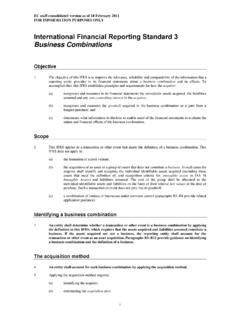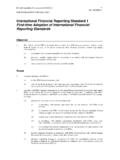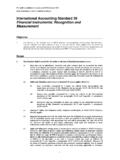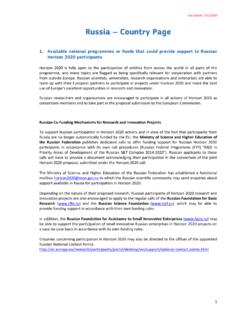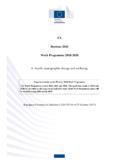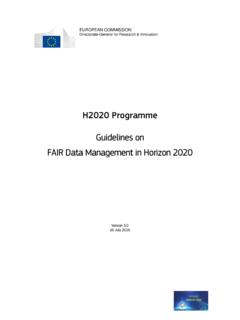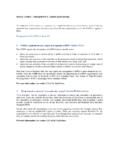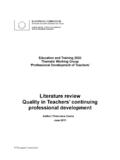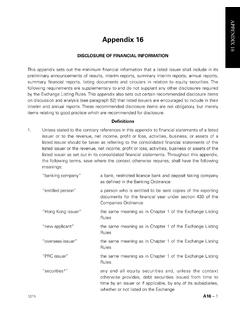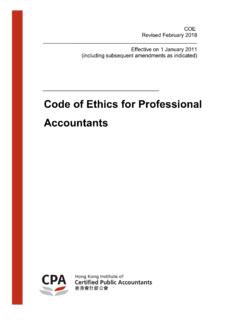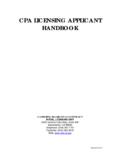Transcription of Guidelines on reporting climate-related information
1 Guidelines on reporting climate-related information Banking and Finance An interactive version of this publication, containing links to online content, is available in PDF format at: Guidelines on reporting climate-related information scan QR code to download European Commission Directorate-General for financial Stability, financial Services and Capital Markets Union European Commission 1049 Bruxelles/Brussel Belgium European Union, 2019. Reproduction is authorised provided the source is acknowledged. For any use or reproduction of individual photos, permission must be sought directly from the copyright holders. CREDITS. All images European Union, except: cover: Fotolia EUROPEAN. COMMISSION. Brussels, C(2019) 4490 final COMMUNICATION FROM THE COMMISSION. Guidelines on non- financial reporting : Supplement on reporting climate-related information EN EN.
2 Important notice This communication has been prepared pursuant to Article 2 of Directive 2014/95/EU in order to assist companies concerned to disclose non- financial information in a relevant, useful, consistent and more comparable manner. It is a supplement to the Guidelines on Non- financial reporting adopted by the Commission in 2017 (C(2017)4234 final). This communication provides non-binding Guidelines , and does not create new legal obligations. To the extent that this communication may interpret Directive 2014/95/EU, the Commission's position is without prejudice to any interpretation of this Directive that may be issued by the Court of Justice of the European Union. Companies using these Guidelines may also rely on international, EU-based or national frameworks. This communication does not constitute a technical standard, and neither preparers of non- financial statements nor any party, whether acting on behalf of a preparer or otherwise, may claim that non- financial statements are in conformity with this document.
3 1. Contents 1 Introduction .. 3. Why provide new Guidelines on climate-related disclosures? .. 3. Benefits for reporting companies .. 4. 2 How to use these Guidelines .. 5. General considerations .. 5. Materiality .. 6. climate-related risks, dependencies, and opportunities .. 8. Structure of the proposed 11. Consistency with recognised reporting frameworks and standards .. 12. 3 Recommended disclosures and further guidance .. 12. Business Model .. 12. Policies and Due Diligence Processes .. 13. 15. Principal Risks and their 15. Key Performance Indicators .. 17. Annex I: Further guidance for banks and insurance companies .. 26. Annex II: Mapping of Non- financial reporting Directive Requirements and TCFD. Recommended Disclosures .. 35. 2. 1 Introduction Why provide new Guidelines on climate-related disclosures? The 2015 Paris Agreement on Climate Change, the United Nations' Sustainable Development Goals and the Special Report of the Intergovernmental Panel on Climate Change (October 2018) all call for accelerated and decisive action to reduce greenhouse gas (GHG) emissions and to create a low-carbon and climate-resilient economy.
4 The EU has agreed ambitious targets for 2030 regarding GHG emission reductions, renewable energy and energy efficiency1, and has approved rules on GHG emissions from land use as well as emissions targets for cars and vans. In 2018 the Commission published its strategic long-term vision for a prosperous, modern, competitive and climate-neutral economy by Companies and financial institutions have a critical role to play in the transition to a low- carbon and climate-resilient economy. Firstly, an additional annual investment of 180. billion is already needed to meet the EU's energy and climate 2030 targets, and further funds will be needed to achieve climate neutrality by 2050. Many of these investments represent significant business opportunities, and much of the funding will need to come from private capital. Secondly, companies and financial institutions need to better understand and address the risks of a negative impact on the climate resulting from their business activities, as well as the risks that climate change poses to their business.
5 Weather-related disasters caused a record 283 billion in economic damages in 2017 and could affect up to two-thirds of the European population by 2100 compared with 5% today. Better disclosure of climate related information by companies can contribute to the implementation of the Sendai Framework for Disaster Risk Reduction 2015-2030, which calls for governments to evaluate, record, share and publically account for disaster losses. In March 2018 the Commission published the Action Plan on Financing Sustainable Growth, with the aim of reorienting capital towards sustainable investment, managing financial risks that arise from climate change and other environmental and social problems, and fostering transparency and long-termism in financial and economic The publication of new Guidelines on the disclosure of climate-related information by companies is part of the Action Plan.
6 A number of other actions in the Action Plan depend to some extent on companies disclosing adequate sustainability-related information . This includes, for example, the proposed regulations on the establishment of a framework (taxonomy) to facilitate sustainable investment4, on sustainability disclosures by institutional investors and asset managers 5, and on carbon-related 1. 2. 3. :52018DC0097. 4. 5. 6. 3. Without sufficient, reliable and comparable sustainability-related information from investee companies, the financial sector cannot efficiently direct capital to investments that drive solutions to the sustainability crises we face, and cannot effectively identify and manage the risks to investments that will arise from those crises. Corporate disclosure of climate related information has improved in recent years.
7 However, there are still significant gaps, and further improvements in the quantity, quality and comparability of disclosures are urgently required to meet the needs of investors and other stakeholders. In June 2017, the Task Force on climate-related financial Disclosures (TCFD), established by the G20's financial Stability Board, published recommendations to encourage financial institutions and non- financial companies to disclose information on climate-related risks and The TCFD recommendations are widely recognised as authoritative guidance on the reporting of financially material climate-related information , and the Commission encourages companies to implement them. A number of governments and financial regulators around the world have expressed support for the recommendations and are integrating them into their guidance and policy frameworks.
8 Examples include Australia, Canada, Hong Kong, Japan, Singapore and South Africa, as well as some EU Member States. This supplement integrates the TCFD recommendations, and provides guidance to companies that is consistent with the Non- financial reporting Directive and the recommendations of the TCFD. The Technical Expert Group on Sustainable Finance, appointed by the Commission in June 2018, provided recommendations on climate-related disclosures and these Guidelines are built on those recommendations. These Guidelines take account of stakeholder feedback on the recommendations of the Technical Expert Group on Sustainable Finance, and of the results of a targeted online consultation carried out by the services of the European Commission in February-March Benefits for reporting companies Better disclosure of climate-related information can have benefits for the reporting company itself, such as: increased awareness and understanding of climate-related risks and opportunities within the company, better risk management, and more informed decision-making and strategic planning.
9 A more diverse investor base and a potentially lower cost of capital, resulting for example from inclusion in actively managed investment portfolios and in sustainability-focused indices, and from improved credit ratings for bond issuance and better credit worthiness assessments for bank loans;. 7. 8. 4. more constructive dialogue with stakeholders, in particular investors and shareholders;. better corporate reputation and maintenance of social licence to operate. 2 How to use these Guidelines General considerations Companies should read this supplement together with the relevant national legislation transposing the Non- financial reporting Directive (2014/95/EU), and if necessary the text of the Directive itself. They should also consider the Non-Binding Guidelines on Non- financial reporting published by the Commission in June 20179, which contain 6 key principles for good non- financial reporting , namely that disclosed information should be: (1) material; (2) fair, balanced and understandable; (3) comprehensive but concise; (4) strategic and forward- looking10; (5) stakeholder oriented; and (6) consistent and coherent.
10 Those principles and the other sections of the Non-Binding Guidelines all apply as appropriate to this supplement. Companies are also encouraged to read the recommendations of the Task Force on Climate- related financial Disclosures, and if relevant the supplementary guidance for the financial sector and for companies operating in the sectors of energy, transport, material and buildings, and agriculture, food and forest Like the general Guidelines published in 2017, this supplement on climate-related reporting is non-binding. Companies may chose alternative approaches to the reporting of climate-related information , provided they meet legal requirements. These Guidelines recognise that the content of climate-related disclosures may vary between companies according to a number of factors, including the sector of activity, geographical location and the nature and scale of climate-related risks and opportunities.
